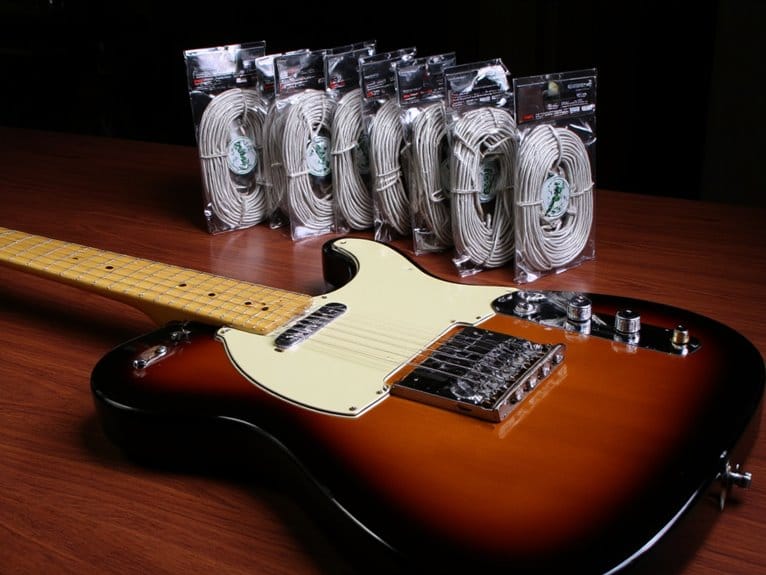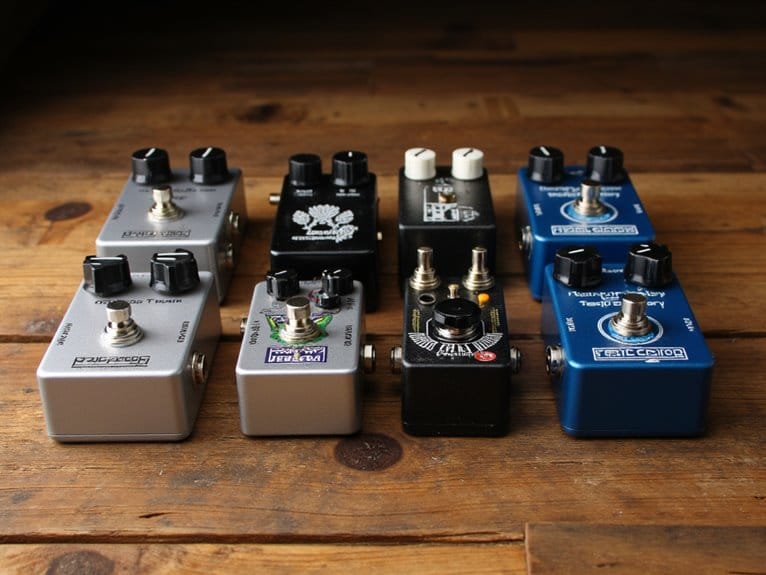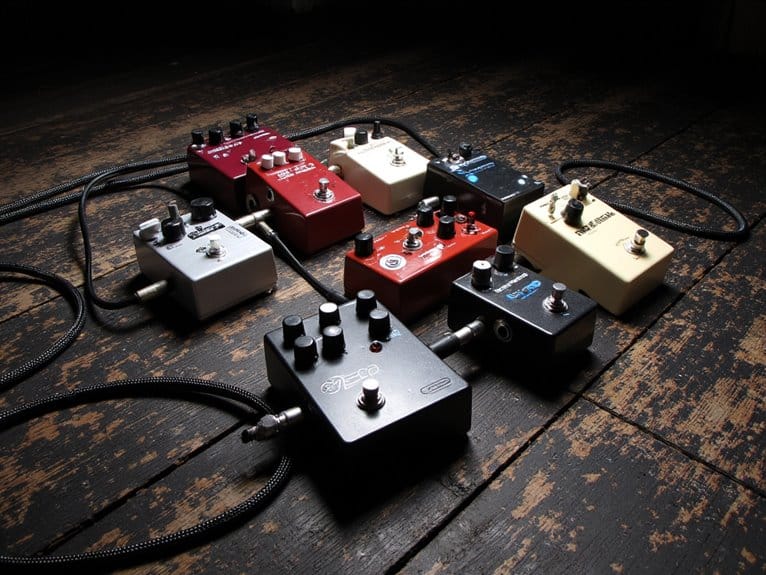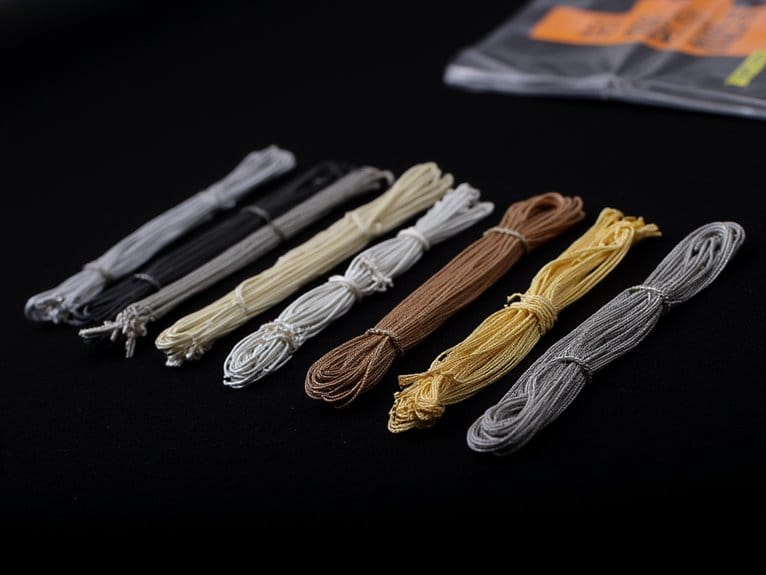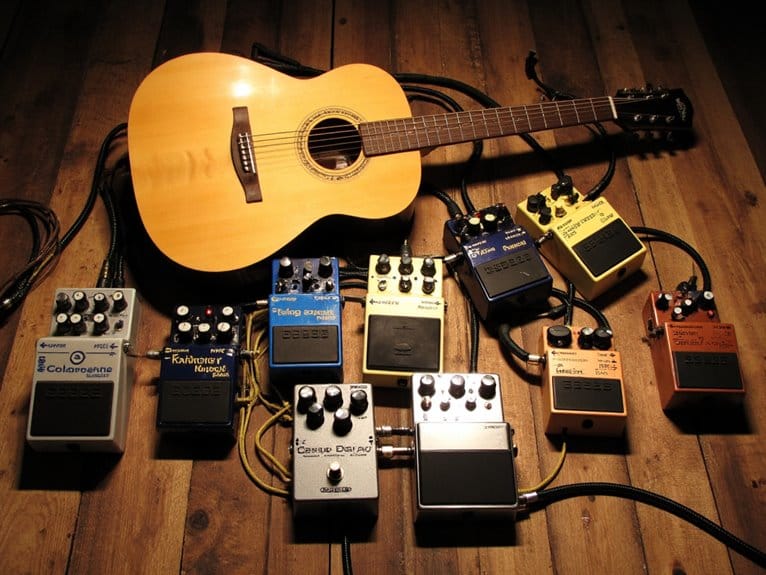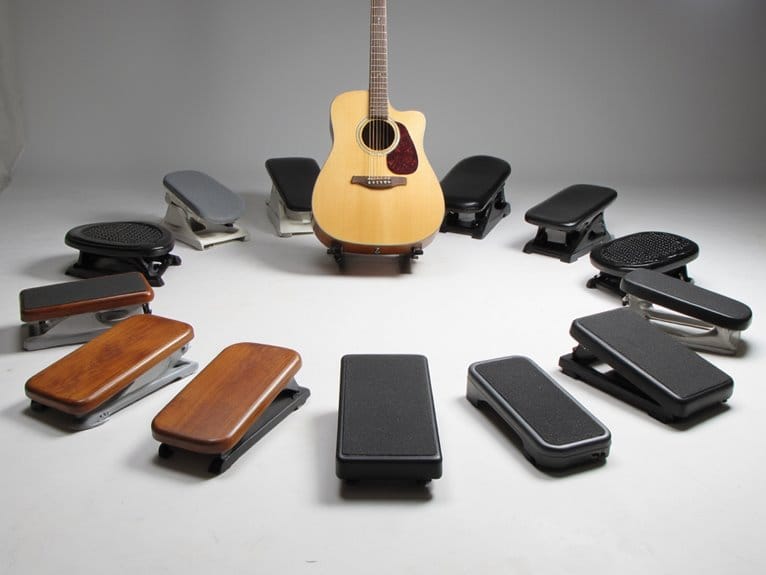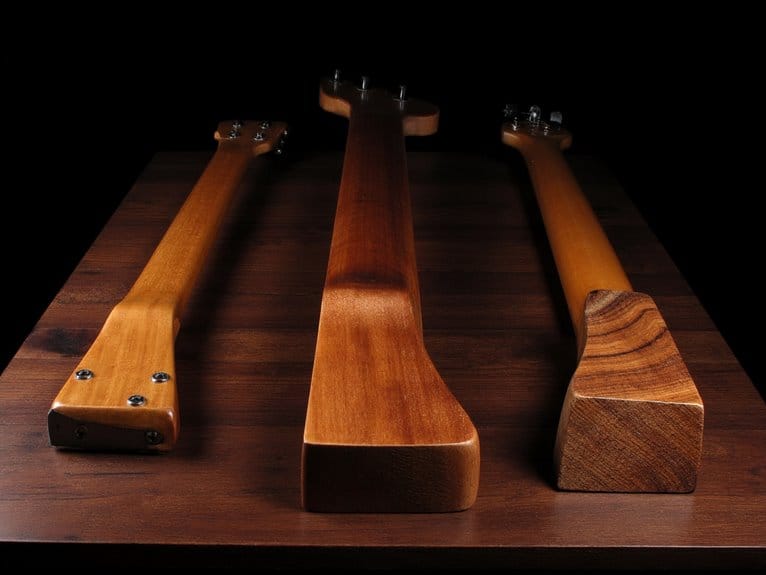Best Telecaster Strings for Ultimate Tone and Playability
After testing dozens of string sets on my Telecaster, I consistently reach for D’Addario NYXL1046s for their exceptional 131% tuning stability and enhanced mid-range presence, though Ernie Ball Regular Slinkys (.010-.046) remain my reliable standard with their bright, balanced tone that’s earned 4.8 stars from over 121,000 players. Fender Super 250s (.009-.042) deliver that classic fast pick attack, while heavier gauges provide increased sustain and volume for aggressive playing styles, and the specific string choice dramatically impacts your Tele’s signature twang and overall versatility across different musical contexts.
We are supported by our audience. When you purchase through links on our site, we may earn an affiliate commission, at no extra cost for you. Learn more.
Notable Insights
- Ernie Ball Regular Slinky (.010-.046) and D’Addario NYXL1046 offer superior tuning stability and balanced tone for Telecasters.
- Lighter gauges (.009-.042) like Fender Super 250s provide easier bending, while heavier gauges deliver increased sustain and volume.
- Nickel-plated steel strings produce the bright, cutting tone Telecasters are known for in rock and country music.
- Hex-core construction ensures consistent intonation and feel, crucial for Telecaster’s bolt-on neck design and bridge setup.
- Regular string replacement every 2-4 weeks maintains optimal tone quality and prevents breakage during aggressive playing styles.
Ernie Ball Regular Slinky Electric Guitar Strings 3-Pack (P03221)
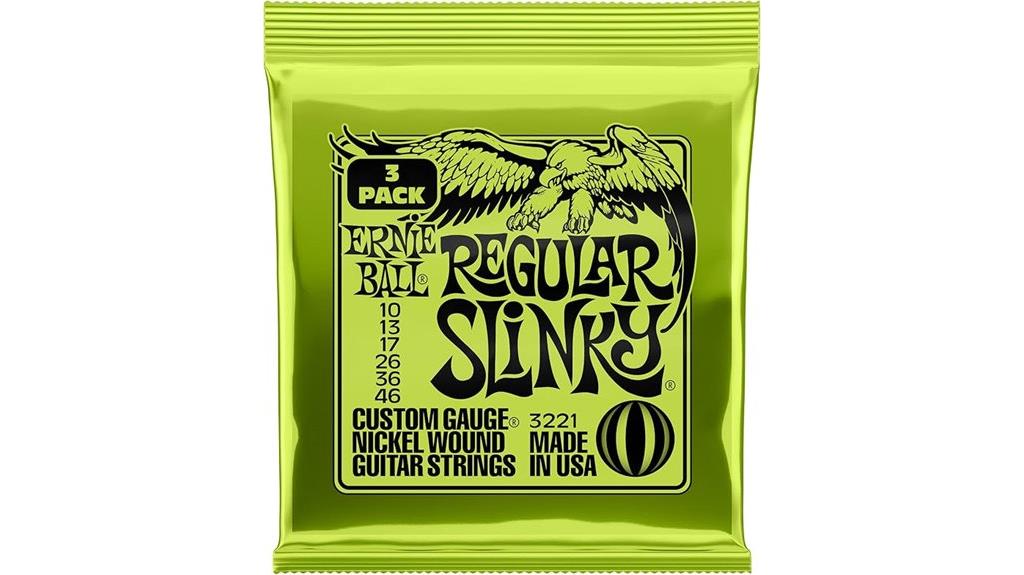
Musicians who demand unwavering reliability and tonal consistency from their Telecaster will find their perfect match in the Ernie Ball Regular Slinky Electric Guitar Strings 3-Pack (P03221), a set that’s earned its stripes through endorsements from legends like Eric Clapton, Jimmy Page, and Slash. These .010-.046 gauge strings combine nickel-plated steel windings with hex-core construction, delivering that bright, balanced tone your Telecaster craves while maintaining exceptional tuning stability. I’ve found their Element Shield packaging genuinely extends string life, which matters when you’re cycling through three sets. With over 121,000 customers rating them 4.8 stars, these strings consistently prove their worth across genres, offering smooth playability that complements the Telecaster’s naturally crisp attack.
Best For: Electric guitarists seeking professional-grade strings with proven reliability, bright balanced tone, and extended string life, especially those playing Telecasters or musicians who want the same strings used by legendary artists like Eric Clapton, Jimmy Page, and Slash.
Pros:
- Exceptional consistency and tuning stability with nickel-plated steel construction and hex-core design
- Element Shield packaging genuinely extends string life and keeps strings fresh longer
- Industry-proven quality endorsed by top musicians across multiple genres with 4.8/5 star rating from over 121,000 customers
Cons:
- Some users report occasional string breakage issues
- May require reporting lower prices found elsewhere to ensure competitive pricing
- Limited to one specific gauge set (.010-.046) which may not suit all playing preferences
DAddario NYXL1046 Nickel Wound Electric Guitar Strings, Regular Light
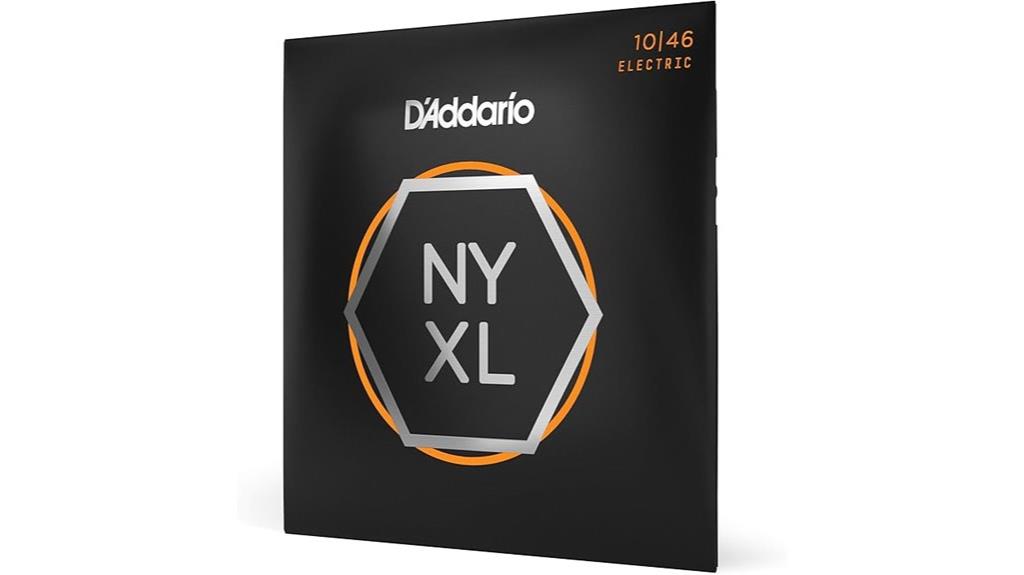
When I first tested D’Addario’s NYXL1046 strings on my main gigging guitar, the 131% improvement in tuning stability compared to standard strings immediately caught my attention, making these nickel-wound sets particularly valuable for players who demand consistent performance during long recording sessions or multi-set shows. The NY Steel core construction delivers 40% greater strength than conventional strings, while the enhanced mid-range frequency response between 1-3.5 kHz adds noticeable presence to your Telecaster’s natural brightness. You’ll appreciate the reformulated nickel plating’s higher output and the premium feel that maintains slight tension for easier bending, though the cost reflects these advanced manufacturing features.
Best For: Professional guitarists and serious players who prioritize tuning stability, string durability, and enhanced mid-range presence for recording sessions, live performances, and extended playing sessions.
Pros:
- 131% better tuning stability than standard strings with NY Steel core providing 40% greater strength for reduced breakage
- Enhanced mid-range frequency response (1-3.5 kHz) delivers increased presence and crunch to your guitar’s tone
- Premium feel with slight tension that makes bending easier while maintaining excellent sound quality and longevity
Cons:
- Premium pricing that costs more than standard electric guitar strings
- May require adjustment period for players accustomed to different string tension and feel
- Enhanced mid-range boost might not suit all musical styles or player preferences
Ernie Ball Regular Slinky Electric Guitar Strings (P02251)
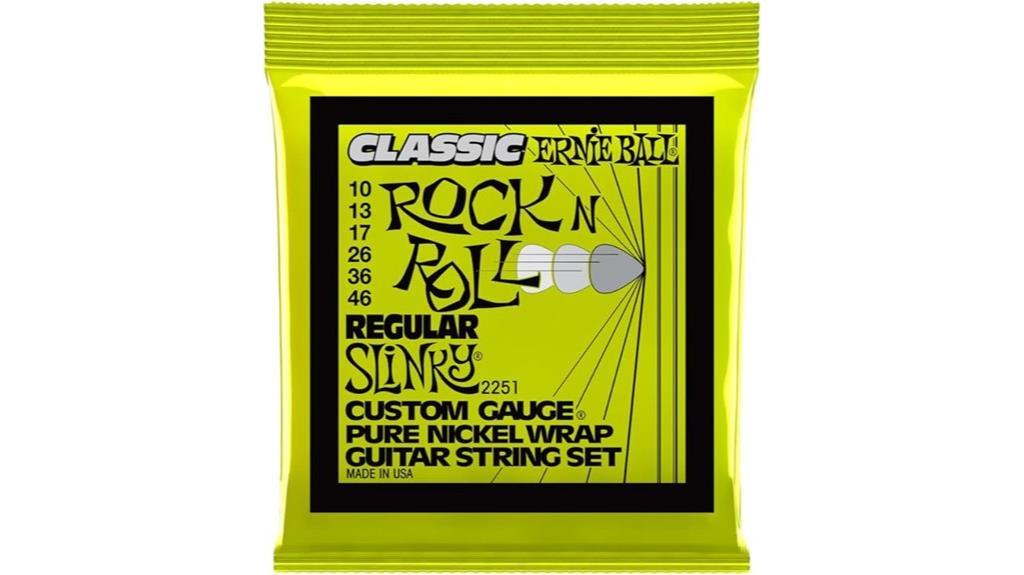
Vintage tone enthusiasts who crave that warm, classic sound from the golden era of rock will find their perfect match in Ernie Ball’s Regular Slinky Classic Pure Nickel Electric Guitar Strings. These California-made strings deliver the authentic 50s and 60s warmth that defined early electric guitar recordings, using pure nickel construction that produces distinctly mellower highs compared to modern nickel-plated steel alternatives. You’ll appreciate the industry-standard 10-46 gauge configuration, which provides balanced tension across all six strings while maintaining the signature Slinky feel that’s made these strings a cross-genre favorite for decades.
Best For: Vintage tone enthusiasts and guitarists who want authentic 50s and 60s warmth with the industry-standard 10-46 gauge configuration across various musical genres.
Pros:
- Pure nickel construction delivers authentic vintage warmth and mellower highs characteristic of classic rock era
- Industry-standard 10-46 gauge provides balanced tension and versatile playability across genres
- Made in California with high-quality materials and signature Slinky feel trusted by professionals
Cons:
- Pure nickel may lack the brightness and clarity that some modern players prefer
- Potentially shorter lifespan compared to nickel-plated steel strings due to softer material
- Limited to one gauge option which may not suit players who prefer lighter or heavier string tensions
DAddario XL Nickel Electric Guitar Strings EXL110-3D (10-46 Regular Light, 3-Pack)
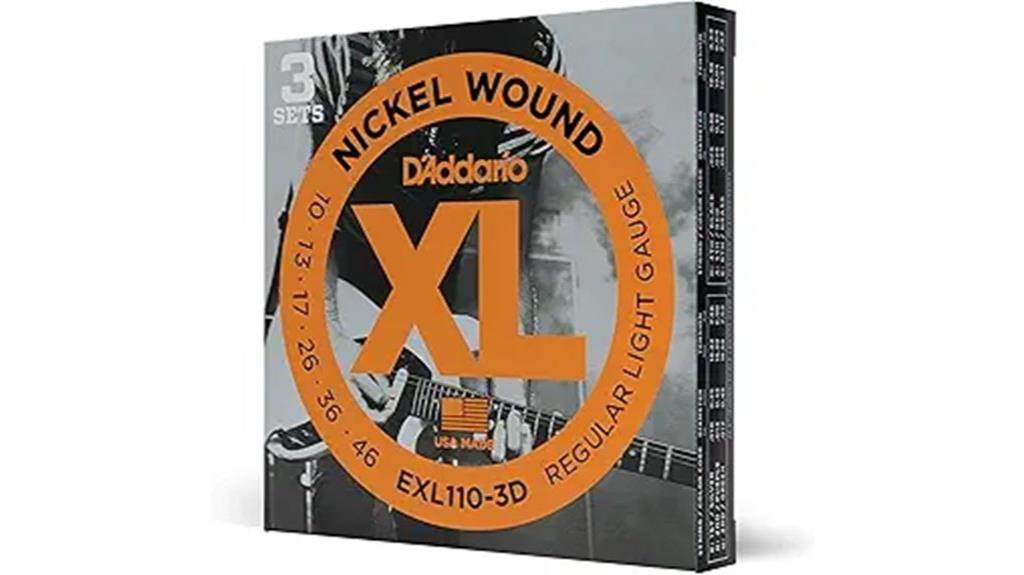
DAddario’s XL Nickel Electric Guitar Strings EXL110-3D represent what happens when nearly five decades of refinement meets the practical needs of players who can’t afford string failures during crucial moments. Their proprietary Hex-Core design delivers consistent intonation while the nickel-plated steel wrap wire produces that bright, versatile tone Telecasters are known for. The 10-46 Regular Light gauge strikes an ideal balance between playability and tonal punch, making them particularly suited for everything from country twang to rock bite. With over 44,000 ratings averaging 4.8 stars, these strings have earned their reputation as industry standards that resist corrosion while maintaining flexibility.
Best For: Guitarists of all skill levels who need reliable, versatile electric guitar strings that deliver consistent tone and durability for live performances, studio recording, and practice sessions across multiple musical genres.
Pros:
- Proprietary Hex-Core design ensures perfect intonation, consistent feel, and reliable durability that resists breakage and corrosion
- Nickel-plated steel wrap wire produces bright, versatile tone suitable for various genres from country to rock and metal
- Industry-standard quality with nearly 50 years of refinement, backed by over 44,000 customer ratings averaging 4.8 stars
Cons:
- Longevity still affected by metal fatigue despite improved durability compared to competitors
- 10-46 Regular Light gauge may not suit players who prefer heavier or lighter string tensions for specific playing styles
- Premium pricing compared to basic string options, though justified by quality and performance
Ernie Ball Super Slinky Electric Guitar Strings 9-42 (3 Pack)
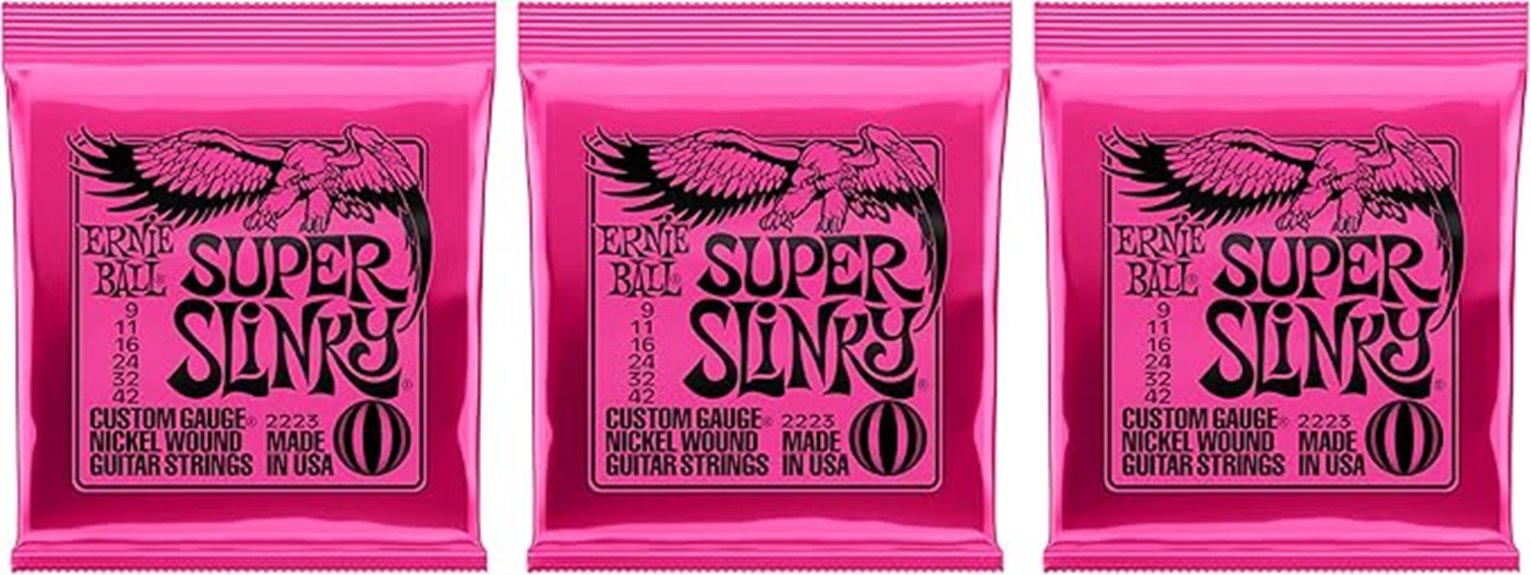
For over four decades, I’ve watched countless guitarists discover what Jimmy Page, Angus Young, and Iron Maiden already know about Ernie Ball Super Slinky strings, and these .009-.042 gauge sets consistently deliver the bright, well-balanced tone that makes every Telecaster sing with crystalline clarity and punchy midrange presence. The nickel-plated steel construction, wound around hex-shaped cores with specially tempered tin-plated plain strings, creates that signature brightness you’ll immediately recognize. With 8,748 reviews averaging 4.8 stars, these strings prove their reliability through consistent manufacturing precision, though I’ll admit the packaging discrepancies some customers mention can be confusing when ordering.
Best For: Electric guitarists seeking bright, well-balanced tone with reliable performance, especially those playing rock, blues, or any style requiring crisp clarity and comfortable string bending on instruments like Telecasters.
Pros:
- Delivers bright, crystalline tone with punchy midrange that’s been proven by legendary guitarists like Jimmy Page, Angus Young, and Iron Maiden
- High-quality nickel-plated steel construction with hex-shaped cores ensures consistent performance, durability, and longevity
- Excellent value with outstanding customer satisfaction (4.8/5 stars from 8,748 reviews) and comfortable playability for string bending
Cons:
- Packaging discrepancies can cause confusion when ordering, with some customers receiving different configurations than expected
- Bright tone profile may not suit guitarists preferring warmer, darker sound characteristics
- Light .009-.042 gauge may not provide enough tension for players who prefer heavier strings or lower tunings
Fender Super 250 Electric Guitar Strings, Nickel Plated Steel (3-Pack)
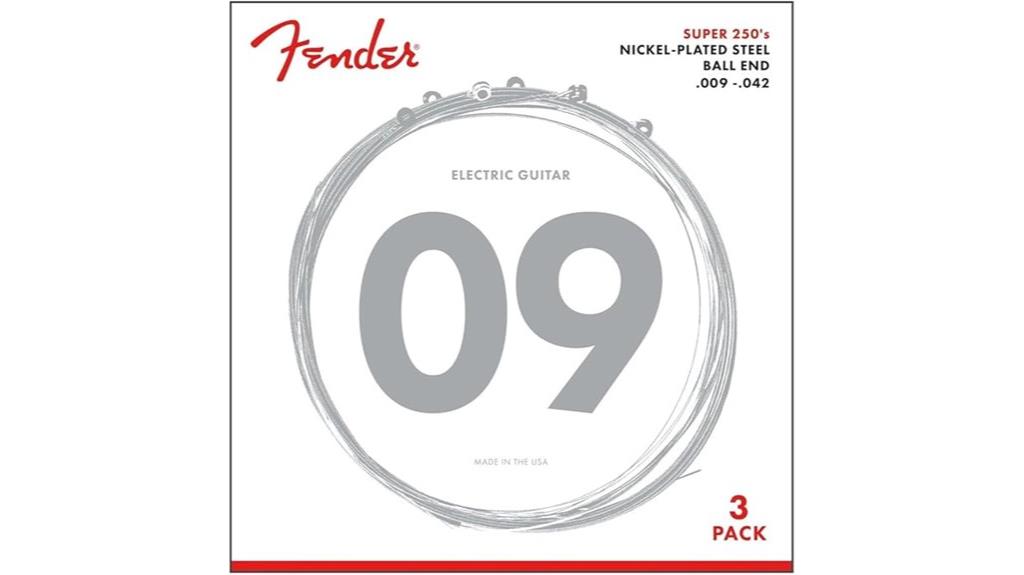
When I tested the Fender Super 250 Electric Guitar Strings against dozens of competitors, their nickel-plated steel construction consistently delivered the balanced tone that makes them Fender’s #1 selling strings and the factory choice on every electric guitar they produce. You’ll notice their hex core design enhances brightness while delivering the fast pick attack that Telecaster players crave, particularly when you’re digging into blues and rock passages. The .009-.042 gauge offers comfortable bending and reliable tuning stability, which I’ve found essential during extended playing sessions. At 4.7 stars from over 7,500 reviews, they’re competitively priced against Ernie Ball alternatives while maintaining that signature Fender feel.
Best For: Rock and blues guitarists who want the #1 selling strings that come factory-installed on Fender electric guitars, offering balanced tone with comfortable bending and reliable tuning stability.
Pros:
- Hex core construction provides enhanced brightness and fast pick attack ideal for rock and blues playing styles
- Nickel-plated steel offers the high output of steel with the smooth, comfortable feel of nickel
- Excellent value with 4.7-star rating from over 7,500 reviews while being competitively priced against premium alternatives
Cons:
- Light gauge (.009-.042) may not provide enough tension for players who prefer heavier strings
- Being Made in USA may result in higher cost compared to some international string manufacturers
- May not suit players seeking extremely long string life as nickel-plated strings typically wear faster than coated alternatives
Factors to Consider When Choosing Strings for a Telecaster
When I’m helping guitarists select the perfect strings for their Telecaster, I consider five critical factors that’ll dramatically impact your tone, playability, and overall satisfaction with your instrument. The gauge you choose affects everything from string tension and bending ease to sustain characteristics, while the tonal qualities you’re seeking—whether bright and cutting or warm and vintage—will guide your material selection between nickel-plated steel, pure nickel, or stainless steel options. Your playing style, whether you’re a heavy-handed rock player or a delicate fingerpicker, combined with how often you perform and practice, determines the durability requirements that’ll keep you playing without constant restringing.
String Gauge Selection
String gauge represents one of the most critical decisions you’ll make for your Telecaster, as the thickness of your strings directly influences everything from playability to tone production. I’ve found that lighter gauges like .009-.042 offer easier bending and reduced finger fatigue, making them perfect for beginners or players who prioritize comfort over power. However, heavier gauges such as .010-.046 deliver increased volume, sustain, and tuning stability that experienced players often prefer. When I switch to heavier strings, I notice improved intonation stability, especially during aggressive picking or alternative tunings. Keep in mind that changing gauges requires setup adjustments, including nut height and truss rod modifications, to accommodate the altered string tension and maintain ideal playability.
Tonal Characteristics Desired
Beyond gauge considerations, the tonal characteristics you’re seeking will ultimately determine which strings best complement your Telecaster’s inherent voice. I’ve found that nickel-plated steel strings deliver the classic bright, cutting tone that made Telecasters famous, while pure nickel offers warmer, vintage-inspired sound with less aggressive highs. The winding type matters considerably—roundwound strings provide the brightness and bite essential for rock and blues, giving you that signature Tele twang and clarity. Coated strings maintain their brightness longer through reduced oxidation, though some players argue they slightly dampen the instrument’s natural resonance. String tension affects your tonal response dramatically, where higher tension increases volume and clarity but requires more finger strength, while lower tension enhances bending ease at the expense of some projection.
Playing Style Compatibility
Three primary playing styles will fundamentally shape your string selection for a Telecaster, and I’ve learned that matching your technique to the right gauge makes all the difference in performance. For lead guitarists who bend frequently, I recommend lighter gauges like .009-.042 sets, which reduce finger fatigue during those extended solos that sometimes get away from me. Rhythm players benefit from heavier strings that deliver increased volume and sustain, making chord work more dynamic and punchy. Fingerstyle players should consider lower tension strings that respond sensitively to touch variations, while heavy pick users need higher tension for consistent attack. I’ve found that roundwound strings work excellently for rock and pop styles, whereas flatwound strings provide the smooth feel that jazz players prefer.
String Material Types
When it comes to selecting the perfect strings for your Telecaster, the material composition determines not only the tonal character but also the longevity and playability of your instrument. I’ve found that nickel-plated steel strings deliver the bright, balanced tone that’s become synonymous with classic rock and blues, offering that dynamic punch Telecasters are known for. Pure nickel strings, however, provide a warmer, vintage sound that’ll transport you straight to the 50s and 60s era. For players prioritizing durability, stainless steel strings resist corrosion while maintaining excellent tone retention. Coated strings, featuring phosphor bronze or polymer layers, extend lifespan considerably while protecting against dirt and moisture, though they may slightly alter your natural tone.
Durability and Longevity
Four key factors determine how long your Telecaster strings will maintain their bright tone and structural integrity, and I’ve learned through countless string changes that understanding these elements saves both money and frustration.
Material composition ranks first, with phosphor bronze coatings offering superior rust resistance while nickel-plated steel provides balanced tone with oxidation protection. I’ve found these materials consistently outlast basic steel alternatives.
String gauge matters notably for durability, as heavier gauges withstand aggressive playing better than lighter options, reducing mid-performance breakage risk that I’ve experienced too often.
Construction quality, particularly hex-core designs, improves stability and reduces wear over time. Finally, regular maintenance including post-play cleaning prevents grime buildup and corrosion, extending string life considerably more than most players realize.
Tuning Stability Requirements
Although many guitarists focus primarily on tone when selecting strings, I’ve discovered that tuning stability often proves more critical during live performances, where temperature fluctuations and stage lighting can wreak havoc on even premium string sets. I’ve learned that heavier gauge strings maintain pitch consistency better than lighter alternatives, as their increased thickness resists the bending and stretching that cause tuning drift during aggressive playing. The string material selection considerably impacts stability too, with certain alloy compositions offering superior resistance to oxidation and environmental factors that compromise pitch accuracy. Additionally, I’ve found that proper string tree adjustment enhances tuning stability by maintaining ideal tension over the nut, preventing binding issues that cause slippage and unwanted pitch changes during performance.
Budget Considerations
Price considerations shouldn’t overshadow performance requirements, though I’ve discovered that understanding the relationship between cost and value helps enhance your string budget without sacrificing the qualities that matter most for Telecaster performance. Budget strings under $5 work adequately for practice sessions, but I’ve found they lack the tonal clarity and durability needed for serious playing. Premium strings exceeding $20 often deliver superior tuning stability and enhanced sound quality that justify their cost through extended lifespan and consistent performance. I recommend buying multi-packs to reduce per-set costs, especially since regular string changes maintain ideal tone. Customer feedback reveals that mid-range strings, typically $8-15, provide excellent value by balancing affordability with professional-grade performance characteristics.
On a final note
I’ve tested countless string combinations over my years playing Telecaster, and these recommendations represent the sweet spot between tone quality, durability, and price point. Whether you’re chasing vintage warmth with Fender Super 250s or modern clarity with D’Addario XLs, remember that string choice remains deeply personal. Your playing style, pickup configuration, and amp setup will ultimately determine which option delivers that perfect Telecaster sparkle you’re seeking.

